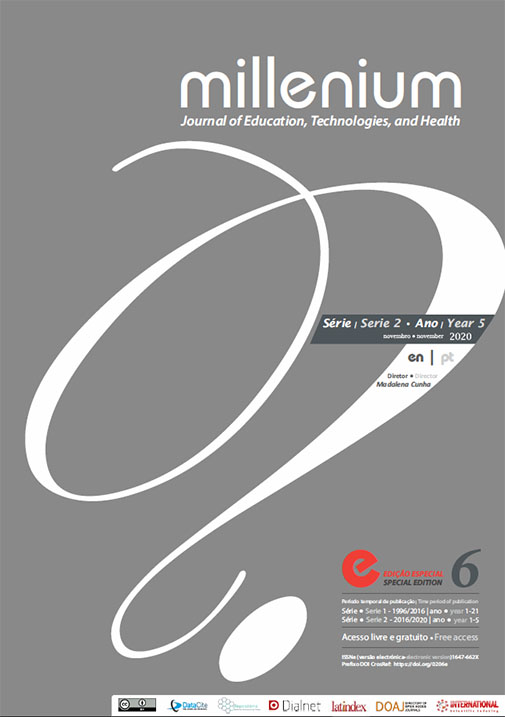La pedagogía de John Dewey y su pertinencia en el primer ciclo de educación básica
DOI:
https://doi.org/10.29352/mill0206e.02.00346Palabras clave:
pedagogía de John Dewey, maestros, 1er ciclo de educación básica, principios teóricos, innovación pedagógicaResumen
Introducción: John Dewey es uno de los educadores más respetados del siglo XX, defendiendo la innovación y la experimentación en el proceso de enseñanza-aprendizaje, por lo que es importante reflexionar sobre estos ideales y su relación con la pedagogía del 1er Ciclo de Educación Básica (CEB).
Objetivos: Conocer la perspectiva de los docentes del 1er CEB sobre los ideales pedagógicos de Dewey; entender si recurren a esta pedagogía y también saben cuáles son las principales dificultades en su implementación y las sugerencias para superarlas.
Métodos: Investigación transversal, descriptiva y comparativa, utilizando una encuesta por cuestionario. La muestra consistió en 96 docentes (84.4% mujeres), con edades comprendidas entre 25 y 61 años (M = 48.30; DP = 6.53), del 1er CEB de tres grupos de escuelas en el municipio de Viseu.
Resultados: La mayoría de los maestros creen que la enseñanza en el 1er CEB se basa en los ideales pedagógicos de Dewey. Sin embargo, consideran que hay factores, como el número de estudiantes por clase o la extensión de los programas, que dificultan su acción pedagógica y presentan sugerencias para superarlos.
Conclusión: Los maestros tienen una perspectiva favorable sobre los principios de la pedagogía de Deweyana, revelando que su acción pedagógica cae dentro de estos principios. Sin embargo, existen serias limitaciones que obstaculizan la acción en línea con estos ideales, que solo una reforma educativa puede ayudar a superar.
Descargas
Citas
Alcoforado, J. (2008). Competências, cidadania e profissionalidade: Limites e desafios para a construção de um modelo português de educação e formação de adultos (Tese de Doutoramento não publicada, Universidade de Coimbra). Repositório Institucional UC. https://eg.uc.pt/handle/10316/7451
Bardin, L. (2016). Análise de conteúdo (35.ª reimp. da 1.ª ed.). S. Paulo: Edições 70.
Branco, M. (2010). O sentido da educação democrática: Revisitando o conceito de experiência educativa em John Dewey. Covilhã: Universidade da Beira Interior.
Correia, J. (1997). A antinomia educação tradicional - educação nova: Uma proposta de superação. Millenium, 2(6), 90-113.
Dewey, J. (1938). Experience and education. Indianapolis: Kappa Delta Pi.
Dewey, J. (1959). Democracy and education. New York: The MacMillan Company.
Dewey, J. (2002). A escola e a sociedade e a criança e o currículo. Lisboa: Relógio D´Água (Trabalhos originais em inglês publicados em 1900/1902).
Festas, A.C. (2014). As finalidades da Educação Tecnológica no âmbito da pedagogia de John Dewey (Relatório Final de Estágio, Mestrado de Ensino em Educação Visual e Tecnológica do Ensino Básico). Escola Superior de Educação de Viseu, Viseu. Repositório Institucional IPV: http://hdl.handle.net/10400.19/2642
Fortin, J. M. (2003). O processo de investigação. Da conceção à realização (3.ª ed.). Loures: Décarie Éditeur, Lusociência.
Higham, R., & Biddulph J. (2018). How has Dewey’s democratic theory influenced the development of a new primary school? A headteacher’s perspective. Education 3-13, 46(4), 385–392. https://doi.org/10.1080/03004279.2018.1445472
Marques, R. (2001). A arte de ensinar: Dos clássicos aos modelos pedagógicos contemporâneos. Lisboa: Plátano Editora.
Mendonça, M (2002). Ensinar e aprender por projetos. Lisboa: Edições ASA.
Ministério da Educação (2006). Organização Curricular e Programas do Ensino Básico – 1.º Ciclo (5.ª ed.). Mem Martins: Departamento da Educação Básica.
Pedanik, R. (2019). How to ask better questions? Dewey's theory of ecological psychology in encouraging practice of action learning. Action Learning: Research and Practice, 16(2), 107-122. Doi: 10.1080/14767333.2018.1451302
Pereira, C., Cardoso, A. P., & Rocha, J. (2015). O trabalho de grupo como fator potenciador da integração curricular no 1.º Ciclo do Ensino Básico. Saber & Educar, 20, 224-233.
Roldão, M. (1994). O pensamento concreto da criança: Uma perspetiva a questionar no currículo. Lisboa: Instituto de Inovação Educacional.
Tarrant, S.P., & Thiele, L.P. (2016). Practice makes pedagogy – John Dewey and skills-based sustainability education. International Journal of Sustainability in Higher Education, 17(1), 54–67. https://doi.org/10.1108/IJSHE-09-2014-0127
Thorburn, M. (2017). John Dewey, William Wirt and the Gary Schools Plan: A centennial reappraisal. Journal of Educational Administration and History, 49(2), 144–156, https://doi.org/10.1080/00220620.2017.1284770
Thorburn, M. (2019). Social democracy, economic liberalism and physical education: A Dewey-informed review of philosophical and pedagogical possibilities. Pedagogy, Culture & Society, 27(1) 151–162. https://doi.org/10.1080/14681366.2018.1513421
Trindade, C. (2009). Educação, sociedade e democracia no pensamento de John Dewey (Dissertação de Mestrado não publicada, Universidade de S. Paulo). Biblioteca Digital USP. Doi: 10.11606/D.48.2009.tde-10092009-155352
Descargas
Publicado
Cómo citar
Número
Sección
Licencia
Derechos de autor 2020 Millenium - Journal of Education, Technologies, and Health

Esta obra está bajo una licencia internacional Creative Commons Atribución 4.0.
Los autores que sometan propuestas para esta revista estarán de acuerdo con los siguientes términos:
a) Los artículos serán publicados según la licencia Licença Creative Commons (CC BY 4.0), conforme el régimen open-access, sin cualquier coste para el autor o para el lector.
b) Los autores conservan los derechos de autor y conceden a la revista el derecho de la primera publicación, se permite la divulgación libre del trabajo, desde que sea correctamente atribuida la autoría y la publicación inicial en esta revista.
c) Los autores están autorización para firmar contratos adicionales separadamente, para la distribución no exclusiva de la versión del trabajo publicada en esta revista (ej.: publicar en un repositorio institucional o como capítulo de un libro), con reconocimiento de la autoría y publicación inicial e esta revista.
d) Los autores tienen permiso y son alentados a publicar y distribuir su trabajo on-line (ej.: en repositorios instituciones o en su página personal) ya que eso podrá generar alteraciones productivas, así como aumentar el impacto y la citación del trabajo publicado.
Documentos necesarios para la sumisión
Plantilla del artículo (formato editable)





